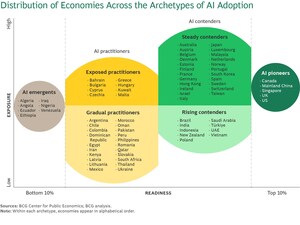BOSTON, June 10, 2021 /PRNewswire/ -- Global financial wealth reached an all-time high of $250 trillion in 2020 as household savings rose and markets showed unexpected resilience in the face of the protracted COVID-19 pandemic, according to a new report by Boston Consulting Group (BCG).
The report, titled Global Wealth 2021: When Clients Take the Lead, reveals that despite the pandemic's enduring financial impact, global prosperity and wealth grew significantly throughout the crisis and are likely to continue to expand significantly over the next five years, in line with the emerging economic recovery.
According to the report, North America, Asia (excluding Japan), and Western Europe will be the leading generators of financial wealth globally, accounting for 87% of new financial wealth growth worldwide between now and 2025.
Many wealth management clients in 2020 embraced alternative investments in their quest for higher returns, shifting away from low-yield debt securities. As part of this trend, real assets, led primarily by real estate ownership, reached an all-time high of $235 trillion. Nevertheless, Asia, which has the largest concentration of wealth in real assets ($84 trillion, 64% of the regional total) will see financial asset growth exceed real asset growth (7.9% versus 6.7%) in coming years. In particular, investment funds in the region will become the fastest-growing financial asset class, with a projected compound annual growth rate (CAGR) of 11.6% through 2025.
Simple Needs and Retirees: Two Attractive Opportunities
In the report, BCG identifies two attractive markets for wealth managers. One consists of individuals with simple investment needs and financial wealth between $100,000 and $3 million. This "simple-needs segment" comprises 331 million individuals worldwide, holds $59 trillion in investable wealth, and has the potential to contribute $118 billion to the global wealth revenue pool.
Anna Zakrzewski, a BCG managing director and partner, global leader of the firm's wealth management segment, and a coauthor of the report, said, "Wealth managers often underserve those in the simple-needs segment with a standardized set of products, and the result is a poor client experience with no "wow" factor. This is essentially a missed opportunity. To better serve this key segment, wealth managers must embrace a new approach that lets them reach a larger audience in a cost-effective and scalable way, but with a highly personalized offering."
Retirees, one of the world's fastest-growing demographics, are another appealing market. Many are underserved and adversely impacted by the "advisory gap" that prevails during the retirement phase of life. Today, individuals over 65 own $29.3 trillion in financial assets accessible to wealth managers. That figure will grow at a CAGR of close to 7% over the next five years, enabling wealth managers globally to target nearly $41.1 trillion in financial wealth by 2025. By 2050, 1.5 billion people globally will fall into the 65+ category, representing an enormous source of wealth.
The New Ultras: A Rapidly Evolving Segment with a Changing Face
In addition to the simple-needs and retirees segments, the "ultra" wealth category—individuals whose personal wealth exceeds $100 million—expanded in 2020, with 6000 people joining the 60,000-strong cohort, which has seen year-on-year growth of 9% since 2015. The category currently holds a combined $22 trillion in investable wealth, 15% of the world's total.
According to the report, China is on track to overtake the US as the country with the largest concentration of ultras by the end of the decade. If investable wealth continues to rise there at its current annual rate of 13%, China will host $10.4 trillion in ultra assets by 2029, more than any other market in the world. The US will be close behind, with a forecasted total of $9.9 trillion in such wealth by 2029.
The faces of the ultras are changing too, with the rise of the next-generation segment. These individuals, between 20 and 50 years of age, have longer investment horizons, a greater appetite for risk, and often a desire to use their wealth to create positive societal impact as well as earn solid returns. Many wealth managers are not yet ready to serve these new ultras.
"High-growth markets represent a massive opportunity, but wealth managers must build a genuine understanding of local differences and also key demographic changes," said BCG's Zakrzewski. "For example, women now account for 12% of ultras, most of whom are based in the US, Germany, and China. The next-gen segment is also going to be an influential driver of future growth in the next decade or so. Whether it's a simple-needs or ultra-high-net-worth client, managers need to offer a personalized service in order to effectively capture the next wave of growth."
A copy of the report can be downloaded here.
To arrange an interview with one of the authors, please contact Eric Gregoire at +1 617 850 3783 or [email protected].
About Boston Consulting Group
Boston Consulting Group partners with leaders in business and society to tackle their most important challenges and capture their greatest opportunities. BCG was the pioneer in business strategy when it was founded in 1963. Today, we work closely with clients to embrace a transformational approach aimed at benefiting all stakeholders—empowering organizations to grow, build sustainable competitive advantage, and drive positive societal impact.
Our diverse, global teams bring deep industry and functional expertise and a range of perspectives that question the status quo and spark change. BCG delivers solutions through leading-edge management consulting, technology and design, and corporate and digital ventures. We work in a uniquely collaborative model across the firm and throughout all levels of the client organization, fueled by the goal of helping our clients thrive and enabling them to make the world a better place.
SOURCE Boston Consulting Group (BCG)

Related Links
WANT YOUR COMPANY'S NEWS FEATURED ON PRNEWSWIRE.COM?
Newsrooms &
Influencers
Digital Media
Outlets
Journalists
Opted In




Share this article